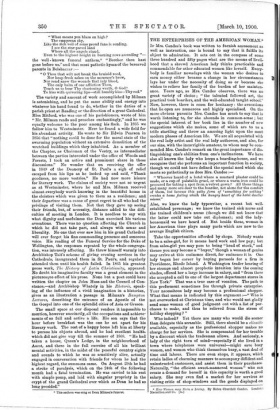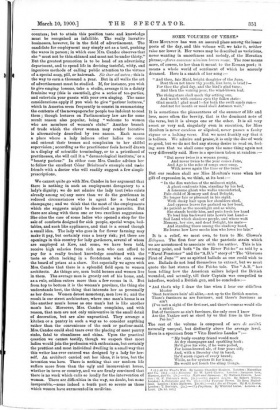THE ENTERPRISES OF TRR AMERICAN WOMAN.* IF Mrs. Candee's book
was written to furnish amusement as well as instruction, one is bound to say that it fulfils its object to admiration. It sets out in the compass of some three hundred and fifty pages what are the means of liveli- hood that a shrewd American lady thinks practicable and commendable for other educated women like herself. Every- body is familiar nowadays with the woman who desires to earn money either because a change in her circumstances lays her under the necessity of doing so or because she wishes to relieve her family of the burden of her mainten- ance. Years ago, as Mrs. Candee observes, there was no great variety of choice ; "the talented followed art, the practical took boarders, and the well-educated taught school." Now, however, there is room for hesitancy : the avocations that lie open are numerous and highly specialised. On the more obvious pursuits Mrs. Candee has much to say that is worth listening to, for she abounds in common-sense ; but
the special interest of her book lies in the number of new suggestions which she makes, some of which are to us a trifle startling and throw an amusing light upon the most
modern phases of American life. We are all acquainted with the real lady artist and the real lady authoress, and also, for our sins, with the incorrigible amateur, to whom may be com- mended Mrs. Candee's remark on the great importance of dis- tinguishing one's abilities from one's inclinations. We have also all known the lady who keeps a boarding-house, and we recognise that she performs an important function in society, though we could not have defined the special need which she meets so pathetically as does Mrs. Candee
"Whoever heard of a hotel where a mustard plaster could be made, or a cup of palatable gruel, or where a warm iron could be procured for taking a spot from a velvet gown ? All these things and many more are dear to the boarder, not alone for the comfort of them, but because this petty form of something for nothing ' creates a home feeling which the hungry heart of the hotel dweller misses."
Also, we know the lady typewriter, a recent but well- established personage; we know the trained sick nurse and the trained children's nurse (though we did not know that
the latter could now take out diplomas); and the lady- housemaid we have heard of. But beside these, woman in
her American time plays many parts which are new to the average English citizen.
Take the opportunities afforded by shops. Nobody wants to be a sales-girl, for it means hard work and low pay; but from sales-girl you may pass to being "head of stock," and
thence you may become a "buyer," though a woman of genius may arrive at this eminence direct, for eminence it is. One lady began her career by buying parasols for a firm in
Providence, Rhode Island. A Washington trader hearing of her strange and almost prophetic intuition into the coming shades, offered her a large increase in salary, and "from there she accepted a call to one of the largest department stores in New York." That was a true case of vocation. The path to this preferment sometimes lies through private enterprise.
Your necessitous lady may become a professional shopper. What that means is indicated by this argument :—" Who is not overworked at Christmas time, and who would not gladly send some woman of good judgment out with a list of pur-
chases to make, and thus be relieved from the stress of holiday shopping P"
Who indeed ? Yet there are many who would die sooner than delegate this scramble. Still, there should be a clientele available, especially as the professional shopper makes no
charge for her services. She is compensated for her trouble by a discount which the tradesman allows. And seriously, a
lady of the right turn of mind—especially if she lived in a town where telephones were universal—might save busy women, and women who think themselves busy, a vast deal of time and labour. There are even shops, it appears, which retain ladies of charming manners to accompany diffident and uninstructed customers, and assist them in their purchases.
Naturally, "the efficient sweet-mannered woman" who can create a demand for herself in this capacity is worth a good salary. She may even find a market for her services as visiting critic of shop-windows and the goods displayed on
How Women may Earn a Living. By Helen Churchill Candee. London : Macmillan land Co. [Ss.] counters; but to attain this position taste and knowledge must be recognised as infallible. The really lucrative businesses, however, lie in the field of advertisement. The candidate for employment may simply act as a tout, pushing the wares in person; in which case Mrs. Candee observes that she "must not be thin-skinned and must not bounder thirty." But the greatest promotion is to be head of an advertising department, and to spend life in devising tasteful, witty, and ingenious methods of calling public attention to the virtues of a special soap, pill, or hairwash. Sic itur ad ctstra : this is the way to earn a thousand a year. But in all walks the art of advertisement must be studied. If, for instance, you wish to give singing lessons, take a studio, arrange it in a dainty feminine way (this is essential), give a series of tea-parties, and entertain your guests with your own singing. The same considerations apply if you wish to give "parlour lectures," which in America seem frequently to consist in summarising the contents of the newspapers for people too indolent to read them ; though lectures on Parliamentary law are for some occult reason also popular, being " welcome to women who are members of women's clubs." Another branch of trade which the clever woman may render lucrative is alternatively described by two names. Each means a place where a lady induces other ladies to come and entrust their tresses and complexion to her skilful supervision, according as the practitioner feels herself drawn in a display of scientific terminology, or to a priesthood of prettinesses, she will call it a "dermatological institute," or a "beauty parlour." In either case Mrs. Candee advises her to follow the excellent Cesar Briolteau's example and make friends with a doctor who will readily suggest a few simple prescriptions.
We cannot quite go with Mrs. Candee in her argument that there is nothing in such an employment derogatory to a lady's dignity; we do not admire the lady tout (who exists already among us) any more than we do the gentleman in reduced circumstances who is agent for a brand of champagne ; and we think that the most of the employments which she suggests might be described as parasitic. But there are along with them one or two excellent suggestions. She cites the case of some ladies who opened a shop for the sale of comforts designed for sick people, special wraps, bed- tables, and such like appliances, and that is a sound though a small idea. The lady who goes in for flower farming may make it pay, but certainly runs a heavy risk; yet there are openings in this country for lady gardeners, several of whom are employed at Kew, and some, we have been told, receive high salaries from rich men who can afford to pay for a really trained knowledge combined with the taste so often lacking in a Scotchman who can sweep the board of prizes at a show. But especially we agree with Mrs. Candee that there is a splendid field open to women architects. As things are, men build houses and women live in them. The average man is greatly out of his home, and, as a rule, seldom enters more than a few rooms in it. But from top to bottom it is the woman's province, the thing she understands beet, the thing that interests her as personally as her dress. Women detest monotony, men love it; and the result is our street architecture, where one man's house is as like another man's house as one man's hat is like another man's hat. Moreover, Mrs. Candee complains, and with reason, that men are not only uninventive in the small detail of decoration, but are also unpractical. They arrange a kitchen or a pantry in such a way as to consider anything rather than the convenience of the cook or parlour-maid. Mrs. Candee could shed tears over the placing of most pantry sinks, fatal to cleanliness and china. Upon the practical question we cannot testify, though we suspect that most ladies would join the profession with enthusiasm, but certainly the prettiest and most individual dwelling in a small way that this writer has ever entered was designed by a lady for her- self. An architect carried oat her ideas, it is true, but the invention was hers. There is nothing that our modern life suffers more from than the ugly and inconvenient house, whether in town or country, and we are firmly convinced that there is no work which calls so loudly for the intervention of woman. There are difficulties in the way, no doubt, but none insuperable,—none indeed a tenth part so severe as those which women have surmounted in medicine.







































 Previous page
Previous page